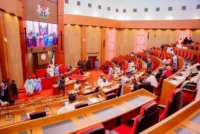Former Kaduna Central Senator, Shehu Sani, voiced his disappointment over the unexpected increase in petrol prices by the Dangote Refinery on Saturday. Sani had anticipated, like many Nigerians, that the commissioning of the Dangote Refinery would lead to a decrease in fuel prices, given the local production of petroleum products. Instead, the news of a price hike left him and many others baffled.
In his post on X, Sani stated, “The expectation was that Dangote Refinery will crash the price of petrol; the news that it’s increasing is baffling.” This sentiment reflects a widespread hope among Nigerians that domestic refining would reduce dependency on imported fuel, thereby lowering costs.
On the preceding day, Friday, the Dangote Petroleum Refinery confirmed an increase in the price of Premium Motor Spirit (PMS) to its customers. The refinery announced that its refined products would now be sold at N955 per litre at the loading gantry. This adjustment means marketers purchasing between 2 million to 4.99 million litres will pay N955 per litre, while those buying 5 million litres or more will pay N950 per litre. This represents a 6.17% increase or N55.5 from the previous price of N899.50 per litre set in December.
The notice from the refinery specified, “Kindly be advised that effective from 5:30 PM today, an upward adjustment has been implemented on the gantry price of Premium Motor Spirit.”
Following this announcement, the retail price of petrol has been observed to increase to between N1030 and N1,050 per litre, directly impacting consumers and businesses alike. This price surge has led to a wave of discussions and criticisms regarding the economic implications for an already struggling populace, where fuel costs significantly affect transportation, goods pricing, and overall living expenses.
The development has sparked debates on the effectiveness of local refining in reducing fuel costs, the transparency of pricing mechanisms, and the broader economic policies surrounding fuel distribution and pricing in Nigeria. While the refinery’s operation was seen as a step towards energy independence and economic benefit, this price hike has instead raised questions about the actual benefits to the average Nigerian consumer.












Why is Dangote Refinery surprising us with fuel price hikes? Shehu Sani is right to call them out! #UnfairPrices
Is Dangote Refinery really to blame for the fuel price hike, or is there more to this story? 🤔
Is this just a case of business strategy or a genuine concern for the people? What do you think?
Wow, can you believe Dangote Refinery did that? Shehu Sani is right to call out the unexpected fuel price hike. What a mess!
Why should Dangote Refinery get special treatment with fuel prices? Shehu Sani is right to call out this unexpected hike.